Summary | Excerpt | Reviews | Beyond the book | Read-Alikes | Genres & Themes | Author Bio
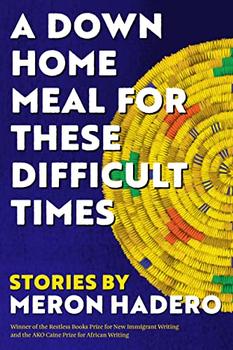
Stories
by Meron HaderoThe opening story of Meron Hadero's debut collection features a young woman, Saba, "on her first ever trip to this city of her birth," Addis Ababa, the capital of Ethiopia. When she prepares to return to America, she discovers that the many items her family members wish her to take back home to other relatives will not fit in the second suitcase she brought for this purpose. Rather than choose whose items to take and who to disappoint, Saba empties her other suitcase of her own belongings, leaving them behind. This act establishes an atmosphere of generosity and benevolence that permeates A Down Home Meal for These Difficult Times, even in stories that are acerbically funny and direct in their portrayal of racism.
In "Mekonnen aka Mack aka Huey Freakin' Newton," an 11-year-old boy named Mekonnen immigrates to New York City with his family in 1989, a period in the city's history in which violence against Black Americans and immigrants was particularly rampant. Mekonnen cannot learn what he needs to know to protect himself at home because, he explains, "it wasn't until they arrived in the US that my parents knew they were Black, and even then, they didn't understand it." They had lived in Ethiopia, "with its own stratifications (light, brown, red, black along with Amhara, Tigray, Oromo, Kembata, and all the other eighty-one tribes that stacked up to form the social framework...)." So, Mekonnen takes to the streets, where a group of teenagers calling themselves the African American All-Stars encourages him to read "Malcolm and MLK and Fannie Lou and Lewis and Baker and Belafonte." The group gives him purpose and community, nicknaming him Huey Newton after the founder of the Black Panther Party (see Beyond the Book). While Mekonnen is spared from the racial attacks that play out in the background of the story, he contends with an insidious string of microaggressions in which he is followed around every corner store by a suspicious proprietor. As a young immigrant, Mekonnen enters a place and time with a long, complicated history that precedes him. Hadero adeptly demonstrates how innocence and ignorance are not viable for a Black child living in a white supremacist society. The knowledge and community Mekonnen gains from the All-Stars give him a fighting chance at survival in a city teeming with racist violence, but even with these tools, his existence is defined by navigating spaces not made for him.
In the mordantly funny "Sinkholes," a teenager in a Florida classroom in the 1990s watches a horrible scene unfold as the teacher asks the students to take turns coming to the chalkboard and writing a racial slur in a misguided lesson related to Ralph Ellison's Invisible Man. As they take turns doing so, the narrator, the only Black person in the room, realizes that his teacher and classmates are waiting for him to write the n-word. The students run out of other slurs and begin writing increasingly ridiculous neologisms like "curly-toed," "flirty-breathed" and "buxom-bearded." The teacher, frustrated that the narrator is not playing his role in this farce, is visibly sweating by the end of the story, insisting that, "This word is not powerful unless we make it so." The story's title comes from the narrator's comment that "[I]n Florida, sinkholes open up out of nowhere, and they suck in everything around them." This situation is a racial sinkhole, sucking the entire room and its inhabitants into the vacuum created by the supposedly powerless unwritten word.
"The Elders" relates the negotiations among members of an Ethiopian community somewhere in Texas as the eldest and most revered gather to decide where a recently deceased man called "Engineer Paulos" should be buried. Should he be laid to rest here, in the country he adopted as his own, or should his remains be returned to his homeland? As the discussion unfolds, passionately argued in both directions, the details of Engineer Paulos's life emerge. After immigrating to the United States, he took a job at an oil company. He was laid off during a recession, at which time he focused his attention on elevating other members of the Ethiopian community. When he was listening to a sporting event on the radio in his car and the national anthem was played, he would pull over, stand and put his hand on his heart. And he was murdered by a group of unknown assailants, targeted because of his race and ethnicity. Hadero reveals these details with quiet pacing. Engineer Paulos is granted a life before the full disclosure of his death. Though he is in some ways established as a model minority, these characteristics are introduced not to garner sympathy for Engineer Paulos from the reader but to articulate the stakes for the remaining members of the community. In discussing the decision of where to bury their friend, those left behind reevaluate their lives in the context of the white supremacist culture that created the conditions for his death.
In each of these stories and many others in the collection, Hadero shows characters who are attempting to move decisively through the world when they are lacking in good options. Mekonnen and the narrator of "Sinkholes" drag the weight of others' expectations and beliefs through an adolescence defined by their difference from those around them. The author subverts traditional narratives about immigration to America, in that these characters have arrived and stepped into a new life receiving not the benefit of greater opportunity but the burden of impossible choices. And there is surprising and incisive humor in Hadero's depictions of Ethiopian immigrant life, which are handled with candid realism around living an existence defined by racism, and also with generosity, kindness and compassion.
![]() This review
first ran in the June 8, 2022
issue of BookBrowse Recommends.
This review
first ran in the June 8, 2022
issue of BookBrowse Recommends.

If you liked A Down Home Meal for These Difficult Times, try these:
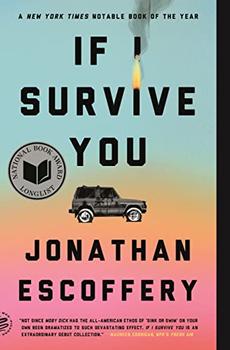
by Jonathan Escoffery
Published 2023
A major debut, blazing with style and heart, that follows a Jamaican family striving for more in Miami, and introduces a generational storyteller.
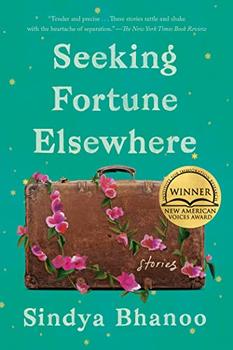
by Sindya Bhanoo
Published 2023
These intimate stories of South Indian immigrants and the families they left behind center women's lives and ask how women both claim and surrender power - a stunning debut collection from an O. Henry Prize winner.

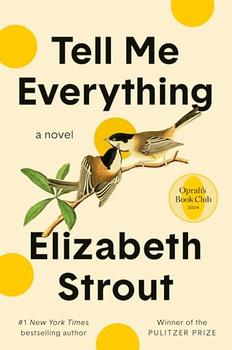
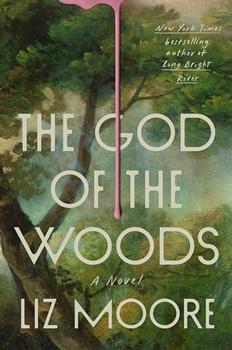

Your guide toexceptional books
BookBrowse seeks out and recommends the best in contemporary fiction and nonfiction—books that not only engage and entertain but also deepen our understanding of ourselves and the world around us.